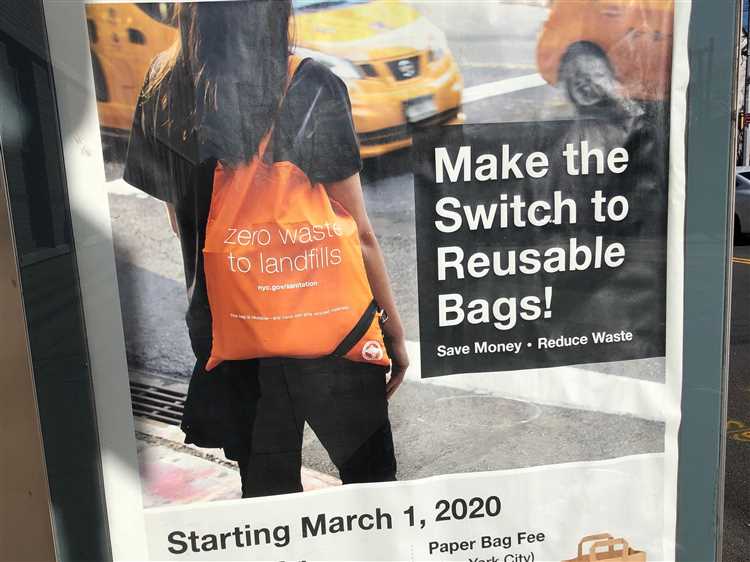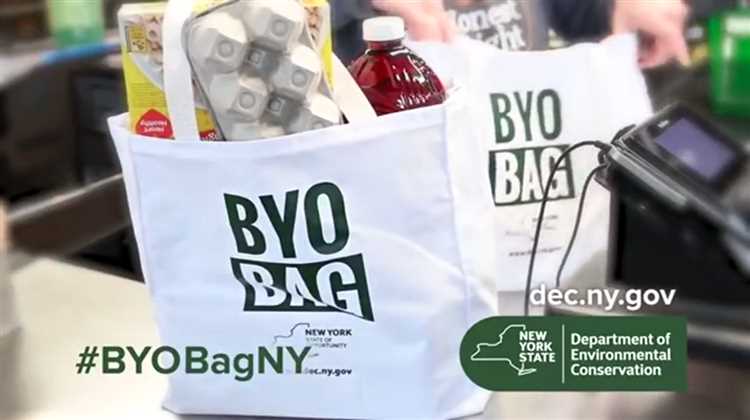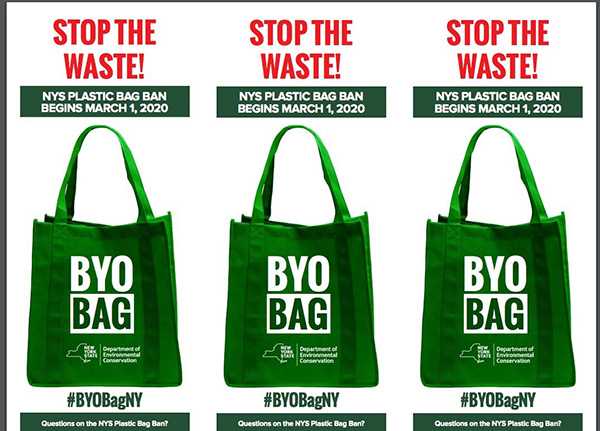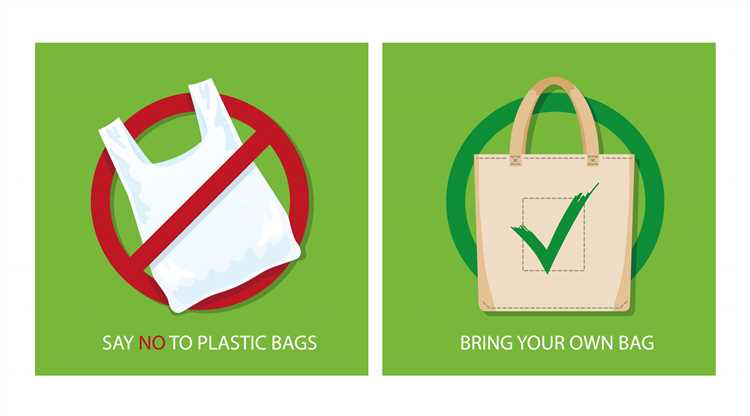
New York has taken a bold step towards reducing its environmental footprint by implementing a ban on single-use plastic bags. This landmark legislation aims to tackle the harmful impact of plastic waste on our planet and promote sustainable alternatives.
Why the ban? Plastic bags have long been a significant contributor to pollution and waste. They take hundreds of years to decompose, clog our rivers and oceans, and harm marine life. The ban is part of an effort to shift towards a more eco-friendly mindset and reduce the reliance on plastic in our daily lives.
What does the ban entail? The ban prohibits most businesses from distributing single-use plastic bags to customers. Instead, consumers are encouraged to bring their own reusable bags or purchase paper or other forms of eco-friendly bags at a small cost. Certain exemptions apply for specific items, such as fresh produce and prescription medications.
How will it affect consumers? While the ban may require a small adjustment in shopping habits, it presents an opportunity for individuals to make a positive impact on the environment. By using reusable bags, consumers can help reduce plastic waste and protect our natural resources. Additionally, the ban may encourage the adoption of more sustainable alternatives and promote a greener lifestyle for all New Yorkers.
- The Plastic Bag Ban in New York: A Comprehensive Guide
- Why was the ban implemented?
- What bags are included in the ban?
- What are the alternatives?
- How does the ban affect businesses?
- What can individuals do to support the ban?
- Understanding the Plastic Bag Ban in New York
- Why the Plastic Bag Ban Was Implemented
- Alternatives to Plastic Bags
- 1. Reusable Bags
- 2. Paper Bags
- 3. Mesh Bags
- 4. Tote Bags
- 5. Compostable Bags
- Impact of the Plastic Bag Ban on Businesses
- How the Plastic Bag Ban Affects Consumers
- 1. Bringing Your Own Bags
- 2. Increased Use of Alternatives
- 3. Changing Shopping Habits
- Future Prospects and Implications of the Plastic Bag Ban
- Environmental Impact
- Shift Towards Reusable Alternatives
- Q&A:
- What is the plastic bag ban in New York?
- When did the plastic bag ban in New York go into effect?
- Why was the plastic bag ban implemented in New York?
- What are the alternatives to plastic bags in New York?
- What are the penalties for violating the plastic bag ban in New York?
The Plastic Bag Ban in New York: A Comprehensive Guide
New York has recently implemented a ban on plastic bags in an effort to reduce pollution and protect the environment. This comprehensive guide provides all the information you need to navigate the new regulations and make the switch to more eco-friendly alternatives.
Why was the ban implemented?
The ban on plastic bags was put in place to address the significant environmental impact these single-use bags have. Plastic bags contribute to pollution, harm wildlife, clog drains, and take hundreds of years to break down in landfills. By banning plastic bags, New York aims to reduce litter, conserve resources, and encourage sustainable practices.
What bags are included in the ban?
The ban applies to most plastic carryout bags provided by retailers. This includes bags with handles that are less than 10 mils thick. However, some exemptions exist, such as bags used for prescriptions at pharmacies, bags for bulk items like produce at grocery stores, and bags for takeout food.
What are the alternatives?
Instead of single-use plastic bags, consumers are encouraged to bring their own reusable bags when shopping. These can include durable canvas bags, recycled plastic bags, or other types of reusable bags. Retailers are also allowed to provide paper bags, although some may charge a fee for them.
How does the ban affect businesses?

Under the new regulations, retailers in New York are prohibited from providing plastic bags to customers. Instead, they must offer reusable bags for sale or provide paper bags for a fee. Businesses that violate the ban may face penalties and fines.
What can individuals do to support the ban?
- Remember to bring your own reusable bags when shopping.
- Spread awareness about the ban and its environmental benefits.
- Reduce your overall use of single-use plastics by choosing alternatives whenever possible.
- Support local businesses that have made the switch to sustainable packaging.
- Properly recycle any plastic bags you may still have.
By following these guidelines, individuals can actively participate in the plastic bag ban and contribute to a cleaner and more sustainable future for New York.
Understanding the Plastic Bag Ban in New York
New York has implemented a plastic bag ban to reduce the harmful effects of plastic waste on the environment. The ban, which went into effect on March 1, 2020, restricts the distribution of single-use plastic bags by retailers.
Under the ban, most retailers, including grocery stores, pharmacies, and convenience stores, are no longer allowed to provide customers with single-use plastic bags at checkout. Instead, customers are encouraged to bring their own reusable bags or can purchase paper bags or thicker, reusable plastic bags for a small fee.
The ban aims to reduce the use of single-use plastic bags, which contribute to pollution, litter, and harm to wildlife. These bags are not biodegradable and can take hundreds of years to break down, causing long-term damage to ecosystems.
The ban does not apply to certain types of bags, such as those used for bulk items, produce, or meat, as well as garment bags and newspaper bags. Restaurants and food delivery services are also exempt from the ban, as they are not considered retailers.
To enforce the ban, retailers are subject to fines if they violate the regulations. The fine for a first offense is $250, followed by $500 for a second offense and $1,000 for each subsequent offense.
New York’s plastic bag ban is part of a larger effort to promote sustainability and reduce waste. By encouraging the use of reusable bags, the ban aims to create a cleaner, more environmentally-friendly state.
| Effective Date | March 1, 2020 |
|---|---|
| Applicable Retailers | Grocery stores, pharmacies, convenience stores, etc. |
| Exemptions | Bulk items, produce, meat, garment bags, newspaper bags |
| Enforcement | Fines: $250 (1st offense), $500 (2nd offense), $1,000 (subsequent offenses) |
Why the Plastic Bag Ban Was Implemented
The plastic bag ban in New York was implemented for several reasons:
- Environmental Impact: Plastic bags are a significant source of pollution, contributing to litter, clogged drains, and harm to wildlife both on land and in water. By banning plastic bags, New York aims to reduce these negative environmental impacts and promote a cleaner and healthier ecosystem.
- Waste Management: Plastic bags are not easily recyclable and often end up in landfills, where they take hundreds of years to decompose. By reducing the use of plastic bags, New York aims to minimize the amount of waste that needs to be managed, saving both landfill space and resources.
- Energy Consumption: The production of plastic bags requires significant amounts of energy and contributes to greenhouse gas emissions. By reducing the demand for plastic bags, New York aims to decrease energy consumption and mitigate climate change.
- Public Health Concerns: Plastic bags can carry bacteria and pose health risks, especially when used to carry food. By encouraging the use of reusable bags, New York aims to improve public health and safety.
- Economic Impact: The implementation of the plastic bag ban promotes the use of reusable bags, which can stimulate the local economy. Additionally, the reduction in plastic bag production can lead to cost savings for businesses and consumers.
The plastic bag ban in New York is part of a larger global movement to reduce plastic waste and promote sustainability. By implementing this ban, New York hopes to inspire other states and countries to take similar actions towards protecting the environment and creating a more sustainable future.
Alternatives to Plastic Bags
With the plastic bag ban in New York, it’s important to find alternative options for carrying your groceries and other items. Fortunately, there are several alternatives to plastic bags that are eco-friendly and sustainable. Here are some options to consider:
1. Reusable Bags
One of the most popular alternatives to plastic bags is using reusable bags. These bags can be made from various materials such as cotton, canvas, or recycled materials. They are durable and can withstand multiple uses, making them a great choice for carrying groceries.
2. Paper Bags

Paper bags are another option to consider. They are biodegradable and can be easily recycled, reducing their environmental impact. While paper bags may not be as durable as reusable bags, they can still serve as a good alternative for lighter items.
3. Mesh Bags
Mesh bags are a lightweight and convenient option for carrying produce and other small items. They are made from a breathable fabric that allows air circulation, which can help keep produce fresh for longer.
4. Tote Bags
Tote bags are versatile and can be used for various purposes. They come in different sizes and designs, making them suitable for grocery shopping, carrying books, or even as a fashion accessory. Tote bags made from sustainable materials, such as organic cotton or recycled materials, are a great eco-friendly option.
5. Compostable Bags
If you still prefer the convenience of disposable bags, you can opt for compostable bags. These bags are made from plant-based materials and can be broken down into compost when disposed of properly. However, it’s important to ensure that these bags are certified as compostable by recognized standards, as some bags may claim to be compostable but do not break down effectively.
By choosing one of these alternatives to plastic bags, you can help reduce the environmental impact of single-use plastics and contribute to a more sustainable future.
Impact of the Plastic Bag Ban on Businesses
The implementation of the plastic bag ban in New York has had a significant impact on businesses, particularly those in the retail and grocery industries. With the ban, businesses are no longer able to provide plastic bags to customers, and instead must offer alternatives such as paper bags or reusable bags.
For some businesses, this has meant an increase in operating costs, as paper bags and reusable bags are often more expensive to procure than plastic bags. Additionally, businesses must invest in educating their employees and customers about the importance of using alternative bags and encouraging them to bring their own bags from home.
However, despite these initial challenges, the plastic bag ban can lead to long-term benefits for businesses. By promoting the use of reusable bags, businesses can enhance their environmental credentials and attract environmentally conscious customers. This can help build brand loyalty and differentiate the business from competitors who do not prioritize sustainability.
Furthermore, the ban can also drive innovation and encourage businesses to develop and market new products that align with the increasing demand for sustainable options. This can create new business opportunities and expand market share for forward-thinking companies.
Businesses that adapt quickly to the plastic bag ban and proactively implement sustainable practices can also benefit from positive PR and media coverage. This can increase brand visibility and enhance the company’s reputation as a socially responsible and environmentally conscious organization.
Overall, while the plastic bag ban presents initial challenges for businesses, it also presents opportunities for growth and innovation. By embracing the ban and adopting sustainable practices, businesses can position themselves for long-term success in an increasingly eco-conscious marketplace.
How the Plastic Bag Ban Affects Consumers
The plastic bag ban in New York has had a significant impact on consumers. Here are a few ways it affects them:
1. Bringing Your Own Bags
With the plastic bag ban in place, consumers are now expected to bring their own reusable bags when shopping. This means that they need to plan ahead and remember to bring their bags when going to stores.
While some consumers may find it inconvenient, others see it as an opportunity to embrace a more sustainable lifestyle and reduce their environmental footprint.
2. Increased Use of Alternatives
Since the ban, many consumers have started using alternative options for carrying their purchases. This includes paper bags, which some stores provide for a small fee, or reusable bags made of fabric or other durable materials.
Using these alternatives not only helps consumers comply with the ban, but also contributes to reducing plastic waste and protecting the environment.
However, it’s worth noting that the use of alternatives may come with its own challenges, such as the need for proper cleaning and maintenance of reusable bags to prevent bacteria buildup.
3. Changing Shopping Habits
The plastic bag ban has also caused a shift in consumers’ shopping habits. Some consumers may choose to shop at stores that offer more sustainable options, such as bulk stores that encourage customers to bring their own containers.
Others may opt for online shopping or delivery services to avoid the hassle of carrying their own bags. This change in shopping habits is likely to continue as consumers adapt to the ban and explore new ways to shop sustainably.
In conclusion, the plastic bag ban in New York has prompted consumers to be more conscious of their environmental impact and make changes in their shopping habits. By bringing their own bags, using alternatives, and exploring different stores and services, consumers can contribute to a cleaner and more sustainable future.
Future Prospects and Implications of the Plastic Bag Ban

With the implementation of the plastic bag ban in New York, there are several future prospects and implications that are worth considering.
Environmental Impact
The primary goal of the plastic bag ban is to reduce plastic waste and limit its negative impact on the environment. By eliminating single-use plastic bags, the ban aims to decrease the number of bags that end up in landfills, waterways, and natural habitats. This reduction in plastic waste can help mitigate the harmful effects on wildlife and ecosystems, as well as reduce carbon emissions associated with plastic production.
Shift Towards Reusable Alternatives
A significant implication of the plastic bag ban is the potential shift towards using reusable alternatives. With single-use plastic bags no longer available, consumers may turn to options such as reusable bags made from eco-friendly materials like cotton or recycled plastics. This shift can encourage a more sustainable lifestyle and promote the adoption of reusable practices beyond just shopping bags, such as reusable water bottles and coffee cups.
The increased use of reusable alternatives can lead to a reduction in overall plastic consumption and waste, further contributing to environmental preservation efforts.
Economic Impact
The plastic bag ban can also have economic implications. While the ban may require an initial adjustment period for businesses and consumers, it can create opportunities for alternative bag manufacturers. This can spur the growth of local industries that produce sustainable and reusable bags, creating jobs and stimulating economic development.
However, it is important to note that businesses that heavily relied on plastic bags may experience short-term financial challenges as they transition to alternative options. To mitigate these impacts, the government can provide support, including grants and financial incentives, to help businesses make the necessary adjustments.
In conclusion, the plastic bag ban in New York has the potential to significantly impact the environment, promote the use of reusable alternatives, and affect the local economy. It represents a step towards a more sustainable future, where plastic waste is reduced, and eco-friendly practices are encouraged.
Q&A:
What is the plastic bag ban in New York?
The plastic bag ban in New York refers to the legislation passed in 2019 that prohibits the use of single-use plastic bags by retailers in the state.
When did the plastic bag ban in New York go into effect?
The plastic bag ban in New York went into effect on March 1, 2020.
Why was the plastic bag ban implemented in New York?
The plastic bag ban was implemented in New York to reduce the environmental impact of plastic bags, which are a source of pollution and take a long time to decompose.
What are the alternatives to plastic bags in New York?
The alternatives to plastic bags in New York include reusable bags made of cloth or other durable materials, paper bags, and compostable bags.
What are the penalties for violating the plastic bag ban in New York?
The penalties for violating the plastic bag ban in New York can range from warnings and educational outreach to fines of up to $500 for repeat offenders.